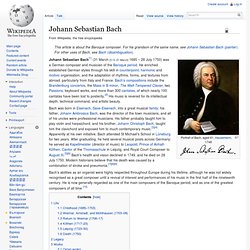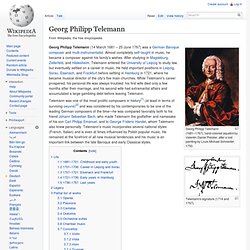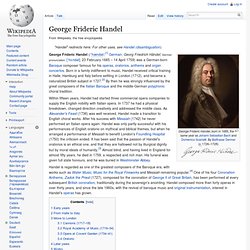

Johann Sebastian Bach. Bach's abilities as an organist were highly respected throughout Europe during his lifetime, although he was not widely recognised as a great composer until a revival of interest and performances of his music in the first half of the nineteenth century.

He is now generally regarded as one of the main composers of the Baroque period, and as one of the greatest composers of all time.[10] Life Childhood (1685–1703) At the age of 14, Bach, along with his older school friend George Erdmann, was awarded a choral scholarship to study at the prestigious St. Michael's School in Lüneburg in the Principality of Lüneburg.[19] Although it is not known for certain, the trip was likely taken mostly on foot.[18] His two years there were critical in exposing him to a wider facet of European culture.
While in Lüneburg, Bach had access to St. Weimar, Arnstadt, and Mühlhausen (1703–08) In January 1703, shortly after graduating from St. In 1706, Bach was offered a post as organist at St. Köthen (1717–23) Georg Philipp Telemann. Georg Philipp Telemann (1681–1767), hand-colored aquatint by Valentin Daniel Preisler, after a lost painting by Louis Michael Schneider, 1750.

Georg Philipp Telemann (14 March 1681 – 25 June 1767) was a German Baroque composer and multi-instrumentalist. Almost completely self-taught in music, he became a composer against his family's wishes. After studying in Magdeburg, Zellerfeld, and Hildesheim, Telemann entered the University of Leipzig to study law, but eventually settled on a career in music. He held important positions in Leipzig, Sorau, Eisenach, and Frankfurt before settling in Hamburg in 1721, where he became musical director of the city's five main churches. While Telemann's career prospered, his personal life was always troubled: his first wife died only a few months after their marriage, and his second wife had extramarital affairs and accumulated a large gambling debt before leaving Telemann.
Telemann's signature (1714 and 1757). Life[edit] Georg Philipp Telemann. George Frideric Handel. George Frideric Handel (/ˈhændəl/;[1] German: Georg Friedrich Händel; German pronunciation: [ˈhɛndəl]; (1685-02-23)23 February 1685 – 14 April 1759(1759-04-14)) was a German-born Baroque composer famous for his operas, oratorios, anthems and organ concertos.

Born in a family indifferent to music, Handel received critical training in Halle, Hamburg and Italy before settling in London (1712), and became a naturalized British subject in 1727.[2] By then he was strongly influenced by the great composers of the Italian Baroque and the middle-German polyphonic choral tradition. Early years[edit] Händel-Haus (2009) – birthplace of George Frideric Handel Entrance of Teatro del Cocomero in Florence From Halle to Italy[edit] Move to London[edit] In 1712, Handel decided to settle permanently in England.
Cannons (1717–18)[edit] Royal Academy of Music (1719–34)[edit] In 1727 Handel was commissioned to write four anthems for the Coronation ceremony of King George II.